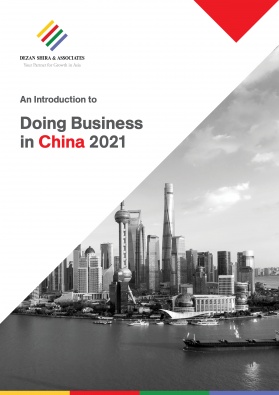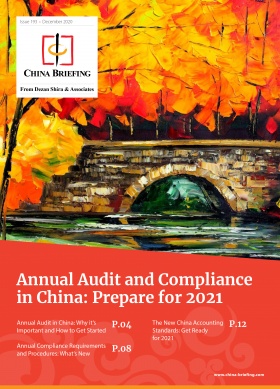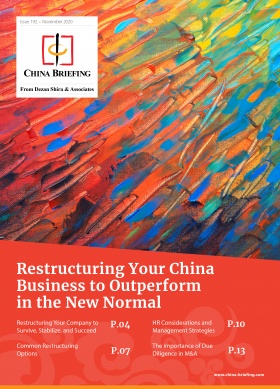The New Beijing Stock Exchange for SMEs – What You Need to Know
On November 15, 2021, the stocks of 81 small and medium-sized enterprises began trading on the newly launched Beijing Stock Exchange. The new stock exchange was personally requested by President Xi Jinping in a video address at the beginning of September. The Beijing Stock Exchange, the third in the Chinese mainland, will be geared toward innovation-oriented SMEs and largely adopt the rules of the National Equities Exchange and Quotation board.
In a speech given online for the opening of the China International Fair for Trade in Services (CIFTIS) on September 2, Chinese President Xi Jinping announced the creation of a new stock exchange in Beijing for small and medium-sized enterprises (SMEs). The new board focuses on innovation-oriented companies as a way of boosting strategic emerging and high-tech industries, and to provide a much-needed injection of capital in SMEs.
In the speech, Xi Jinping also stated that the city would reform the “New Third Board”, referring to the National Equities Exchange and Quotation (NEEQ) board, an existing stock trading system in Beijing that lists cheaper stocks of smaller companies.
The NEEQ is the sole shareholder of the Beijing Stock Exchange (BSE) and the Party Secretary of the NEEQ Xu Ming has also been appointed as its legal representative and chairman.
The BSE began trading on November 15, 2021, with a total of 81 stocks initially listed.
What is the NEEQ and what is its relationship to the BSE?
The NEEQ is an exchange for over-the-counter trading of stocks in smaller ‘public limited companies’. It is often seen as a kind of entry-level system for smaller companies to raise capital before listing on China’s two main stock exchanges or overseas. It is also the only company-run stock exchange in China, operated by the National Equities Exchange and Quotation Co. Ltd.
The NEEQ has a 100 percent stake in the BSE, which is based on the NEEQ Select Board. The Select Board is the NEEQ’s highest level board dedicated to innovation-oriented SMEs that meet certain market capitalization requirements and have been listed on the NEEQ for at least a year.
71 of the companies listed on the BSE were moved over from NEEQ Select. The remaining 10 companies made their stock market debut on the new bourse. Meanwhile, companies listed on NEEQ Innovation, the exchange’s second-tier board, can apply to be listed on the BSE, provided they have been listed on the NEEQ Innovation board for at least 12 months and meet other requirements.
By the end of 2020, there were 8187 SMEs listed on the NEEQ, raising a total of RMB 33.9 billion (US$5.3 billion) over the course of the year.
How is the BSE regulated?
The CSRC, NEEQ, and BSE have released several rounds of rules for the bourse’s operations, as well as regulations on company listings and investor eligibility.
The first set of draft rules were released on September 5, when the NEEQ, following approval from the China Securities Regulatory Commission (CSRC), began soliciting opinions from the industry on three sets of draft rules for operating the BSE: the BSE Stock Listing Rules (Trial), the BSE Trading Rules (Trial), and the BSE Member Management Rules (Trial).
Later, on September 17, the BSE released a set of rules, titled the Beijing Stock Exchange Investor Suitability Management Measures (Trial), detailing the eligibility requirements for investors to take part in trading on the bourse.
Finally, on October 30, the CSRC released a series of documents finalizing the basic rules and regulations for operating the bourse
Trading and listing rules
As the BSE is based on the NEEQ Select Board, the listing rules for the NEEQ Select will also be migrated to the new exchange.
The following are some of the fundamental trading rules for the BSE outlined in the trial regulations:
- No compulsory regulation for company cash dividend ratios.
- 30 percent daily price fluctuation limit after the first day of trading.
- Trading suspension of a maximum of 10 trading days for major asset restructuring or secondary offerings for asset acquisition.
- No limit on price change on the first trading day, but a 10-minute trading suspension implemented for stock prices rises of over 30 percent and drops of over 60 percent.
The trial rules also outline basic requirements for companies to list on the BSE. The requirements include:
- Listing on the NEEQ Innovation board for a minimum of 12 consecutive months.
- A minimum of RMB 50 million (US$7.7 million) in net assets at the end of the most recent year.
- A minimum public offering of 1 million shares to unspecified accredited investors with an issue target of 100 people.
- A total share capital of minimum RMB 30 million (US$4.6 million) after listing.
- A minimum of 200 shareholders after listing and for a minimum of 25 percent of the total capital stock to be held by public shareholders (or 10 percent for companies with a capital stock of over RMB 400 million (US$62 million).
In addition, companies must meet at least one of the below requirements:
- An estimated market valuation of at least RMB 200 million (US$31 million) and a net profit of at least RMB 15 million (US$2.3 million) in the past two years with a weighted average return on equity (ROE) of at least 8 percent, or a net profit of RMB 25 million (US$3.9 million) in the past year with a weighted average ROE of minimum 8 percent.
- An estimated market valuation of at least RMB 400 million (US$62 million), an average operating income in the last two years of at least RMB 100 million (US$15.5 million), a minimum 30 percent operating income growth rate in the last two years, and a positive net cash flow from operating activities in the last year.
- An estimated market valuation of RMB 800 million (US$123.9 million), a minimum operating income of RMB 200 million (US$31 million) in the last year, and a total R&D investment accounting for a minimum of 8 percent of the total operating income in the last two years.
- An estimated market valuation of RMB 1.5 billion (US$232.3 million) and a total R&D investment of at least RMB 50 million (US$7.7 million) in the past two years.
Investor requirements
The BSE’s rules for investor participation released on September 17 outline the eligibility requirements for investors to participate in trading.
For individual investors, the participation requirements are:
- Have a daily minimum of RMB 500,000 (US$78,324) in assets in their securities and capital account for the duration of 20 trading days before the trading authority opens; and
- Have a minimum of two years of trading experience.
There are no minimum capital requirements for institutional investors.
Will foreign investors be able to participate in the BSE?
The participation of foreign investors in the BSE is still relatively limited at the time of writing. Currently, only Qualified Foreign Institutional Investors (QFII) and Renminbi Qualified Institutional Investors (RQFII) are eligible to trade stocks listed on the bourse. This principle is a direct adoption of rules introduced in September 2020 to expand the stocks available to foreign investors to those listed on the NEEQ.
The QFII and RQFII are programs that allow foreign investment institutes that meet certain criteria to invest in A-shares (RMB shares listed on mainland China stock exchanges that are only available to foreign investors through certain channels).
While this makes it possible for certain investors to discover and tap into up-and-coming innovative companies on the scene, the scope of foreign institutions that can take advantage of the new stock exchange will remain somewhat limited as there are still some eligibility requirements for obtaining QFII and RQFII status.
In addition, it remains to be seen whether the BSE will become part of China’s Stock Connect program, an investment channel that allows overseas individual and institutional investors to trade in A-Shares on mainland China stock exchanges through local brokers, and vice versa. There are currently Stock Connect programs between Hong Kong and Shanghai, Hong Kong and Shenzhen, and London and Shanghai. This is currently the most common means through which foreign investors trade in China-listed stocks. Beijing’s addition to it would greatly expand share opportunities for foreign investors.
Boosting SMEs for economic growth and technological innovation
The creation of this new stock exchange will help to give a much-needed injection of capital to SMEs, a section of the economy that has been particularly hard-hit by the Covid-19 lockdowns, rising commodity prices, and an irregular economic rebound.
Boosting growth among SMEs has been a long-term goal for the Chinese government, which positions these companies as central to a myriad of goals, including economic growth, consumption upgrade, employment, and technological innovation.
In particular, the government sees healthy competition among smaller private companies as critical to getting ahead in key technology and innovation sectors, including industries that are of strategic importance to China, such as artificial intelligence, microchips, and new energy, to name a few.
The importance of SMEs to China’s economy is also backed up by numbers. According to Statista, SMEs account for 60 percent of the country’s GDP, 70 percent of patents, and employ 80 percent of workers in China.
To this end, the government has adopted several measures to help boost development. For example, the government has taken steps to even the playing field for SMEs. Recent crackdowns on anti-competitive behavior by major technology companies, such as Alibaba-backed fintech company Ant Financial and gaming giant Tencent, could serve to provide more breathing room for smaller companies.
But stimulus for SMEs has mainly focused on the tried and tested measure of expanding the loans available to smaller businesses, which have often been difficult to access due to SMEs’ inability to provide banks with collateral.
In a step to address this issue, at a routine meeting chaired by Premier Li Keqiang on September 1, the State Council ordered the People’s Bank of China (PBOC) to provide RMB 300 billion (US$46.5 billion) in re-loans to support local banks to issue loans to SMEs and individual businesspeople. In an explainer published a few days later on the central government website, the government clarified that the re-loans are to be issued by the end of the year.
The new stock exchange for SMEs and expansion of loans for small companies, therefore, represents a two-pronged approach for stimulating growth in this economically important portion of the economy.
This notion was reinforced by a representative of the CSRC, who, at a press conference following the announcement made by Xi Jinping, stated that “SMEs can do big things” and that creating a BSE is an “important measure for implementing a national innovation-driven development strategy”, “deepening structural reform for the financial supply-side”, and is “hugely significant for developing capital market functions, promoting the integration of technology and capital, and supporting innovation and development among SMEs.”
On its first day of trading, the BSE registered a turnover of US$1.5 billion with the 10 newly listed stocks all experiencing price surges. Thus far, analysts have praised the bourse’s relatively strong performance, although it is not expected to make a huge turnover given its relatively small scope and the small size of the companies listed.
This article was updated on November 18, 2021, to reflect the latest developments. The original article was published on September 10, 2021.
About Us
China Briefing is written and produced by Dezan Shira & Associates. The practice assists foreign investors into China and has done so since 1992 through offices in Beijing, Tianjin, Dalian, Qingdao, Shanghai, Hangzhou, Ningbo, Suzhou, Guangzhou, Dongguan, Zhongshan, Shenzhen, and Hong Kong. Please contact the firm for assistance in China at china@dezshira.com.
Dezan Shira & Associates has offices in Vietnam, Indonesia, Singapore, United States, Germany, Italy, India, and Russia, in addition to our trade research facilities along the Belt & Road Initiative. We also have partner firms assisting foreign investors in The Philippines, Malaysia, Thailand, Bangladesh.
- Previous Article Solicitud de una carta PU para visitar China
- Next Article Can China Join the Digital Economy Partnership Agreement?







